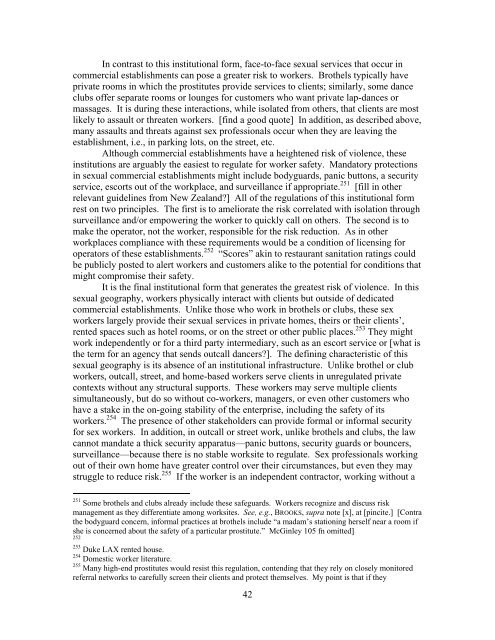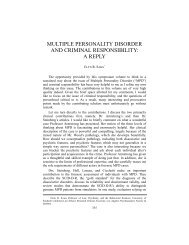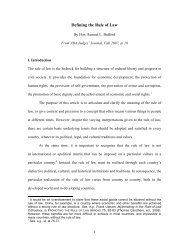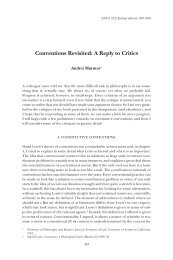1 Regulating Sex Work Adrienne D. Davis VERY ROUGH DRAFT ...
1 Regulating Sex Work Adrienne D. Davis VERY ROUGH DRAFT ...
1 Regulating Sex Work Adrienne D. Davis VERY ROUGH DRAFT ...
You also want an ePaper? Increase the reach of your titles
YUMPU automatically turns print PDFs into web optimized ePapers that Google loves.
In contrast to this institutional form, face-to-face sexual services that occur in<br />
commercial establishments can pose a greater risk to workers. Brothels typically have<br />
private rooms in which the prostitutes provide services to clients; similarly, some dance<br />
clubs offer separate rooms or lounges for customers who want private lap-dances or<br />
massages. It is during these interactions, while isolated from others, that clients are most<br />
likely to assault or threaten workers. [find a good quote] In addition, as described above,<br />
many assaults and threats against sex professionals occur when they are leaving the<br />
establishment, i.e., in parking lots, on the street, etc.<br />
Although commercial establishments have a heightened risk of violence, these<br />
institutions are arguably the easiest to regulate for worker safety. Mandatory protections<br />
in sexual commercial establishments might include bodyguards, panic buttons, a security<br />
service, escorts out of the workplace, and surveillance if appropriate. 251 [fill in other<br />
relevant guidelines from New Zealand?] All of the regulations of this institutional form<br />
rest on two principles. The first is to ameliorate the risk correlated with isolation through<br />
surveillance and/or empowering the worker to quickly call on others. The second is to<br />
make the operator, not the worker, responsible for the risk reduction. As in other<br />
workplaces compliance with these requirements would be a condition of licensing for<br />
operators of these establishments. 252 “Scores” akin to restaurant sanitation ratings could<br />
be publicly posted to alert workers and customers alike to the potential for conditions that<br />
might compromise their safety.<br />
It is the final institutional form that generates the greatest risk of violence. In this<br />
sexual geography, workers physically interact with clients but outside of dedicated<br />
commercial establishments. Unlike those who work in brothels or clubs, these sex<br />
workers largely provide their sexual services in private homes, theirs or their clients’,<br />
rented spaces such as hotel rooms, or on the street or other public places. 253 They might<br />
work independently or for a third party intermediary, such as an escort service or [what is<br />
the term for an agency that sends outcall dancers?]. The defining characteristic of this<br />
sexual geography is its absence of an institutional infrastructure. Unlike brothel or club<br />
workers, outcall, street, and home-based workers serve clients in unregulated private<br />
contexts without any structural supports. These workers may serve multiple clients<br />
simultaneously, but do so without co-workers, managers, or even other customers who<br />
have a stake in the on-going stability of the enterprise, including the safety of its<br />
workers. 254 The presence of other stakeholders can provide formal or informal security<br />
for sex workers. In addition, in outcall or street work, unlike brothels and clubs, the law<br />
cannot mandate a thick security apparatus—panic buttons, security guards or bouncers,<br />
surveillance—because there is no stable worksite to regulate. <strong>Sex</strong> professionals working<br />
out of their own home have greater control over their circumstances, but even they may<br />
struggle to reduce risk. 255 If the worker is an independent contractor, working without a<br />
251<br />
Some brothels and clubs already include these safeguards. <strong>Work</strong>ers recognize and discuss risk<br />
management as they differentiate among worksites. See, e.g., BROOKS, supra note [x], at [pincite.] [Contra<br />
the bodyguard concern, informal practices at brothels include “a madam’s stationing herself near a room if<br />
she is concerned about the safety of a particular prostitute.” McGinley 105 fn omitted]<br />
252<br />
253<br />
Duke LAX rented house.<br />
254<br />
Domestic worker literature.<br />
255<br />
Many high-end prostitutes would resist this regulation, contending that they rely on closely monitored<br />
referral networks to carefully screen their clients and protect themselves. My point is that if they<br />
42














